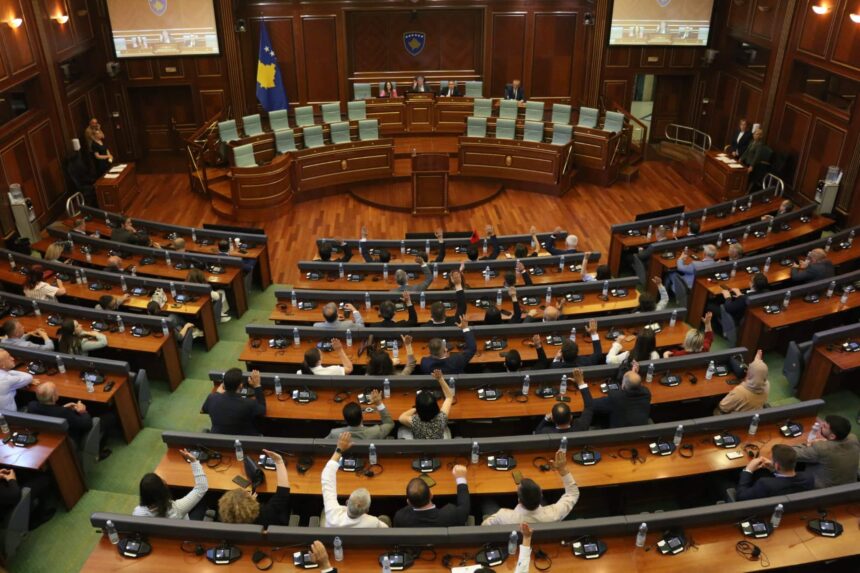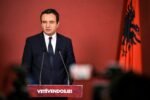Once again, MPs have failed to constitute the Assembly of Kosovo, even as they called for the formation of institutions amid growing global geopolitical tensions and a statement from U.S. President Donald Trump regarding Kosovo-Serbia relations.
Mimoza Kusari-Lila of the Vetëvendosje Movement said Trump’s statement is being “misused by internal forces for political gain.”
On Sunday, Trump wrote on Truth Social that during his first term, Kosovo and Serbia were “on the brink of a major clash” and a war was close to erupting, but he claimed he stopped it. He blamed his successor, former President Joe Biden, for “damaging the long-term prospects” with several “senseless decisions,” while promising, “I will fix it again.”
Trump made the statement as he called for peace in the Middle East, with Israel and Iran engaged in repeated attacks since Friday.
Kusari-Lila said Trump’s reference was to the 2020 Washington agreement between Kosovo and Serbia on economic normalization, not to current events in Kosovo.
She noted that some have interpreted his remarks as a call for Kosovo to urgently establish its institutions.
“I am convinced that with everything happening globally, our state or the Balkans hold very little—if any—attention on his agenda,” Kusari-Lila added, calling the use of Trump’s words for internal political battles “absurd.”
Meanwhile, the Democratic Party of Kosovo (PDK) urged acting Prime Minister Albin Kurti and his Vetëvendosje party to act responsibly, stressing that “the world is changing every day.”
PDK leader Memli Krasniqi warned that if Kosovo were to receive an urgent request from the U.S. to adopt a more proactive stance on a potential Kosovo-Serbia agreement, failing to have consolidated institutions would certainly harm the country.
Lutfi Haziri of the Democratic League of Kosovo (LDK) also commented on Trump’s statement. He said the U.S. president is expected to play a critical role in Kosovo’s peace process and state-building, urging the country to prepare for this.
“The biggest warning is his return to what he called damage to the peace process,” Haziri said, reaffirming LDK’s position that the Ohrid Agreement was harmful. He added that coordination between the EU and a future Trump administration is likely, and that “the specific weight of the U.S. stance and Trump’s role in Kosovo’s final state-building phase will be critical.”
Fatmir Limaj, leader of the Social Democratic Initiative, whose party holds three seats, said new institutions must be formed quickly. He argued that political leaders have yet to “fully grasp what is happening around us and in the world.”
“[President Trump] has sent signals about his approach to resolving problems,” Limaj said, emphasizing that Kosovo must act quickly to remain a reliable and ready partner.
Serb MP Nenad Rašić spoke about Trump’s potential shift in policy. He recalled U.S. support in overcoming past political deadlocks, including the selection of Atifete Jahjaga as President, but said he is unsure whether Washington will again take such a “political leap.”
“We do need stimulation from the American administration, but we also must be more decisive,” he concluded.
Duda Balje, a Bosniak MP, said Kosovo’s politicians themselves must find a solution, without depending on external interventions.
She urged leaders to show they are serious by overcoming “political grudges” and forming new institutions.
In the 33rd failed attempt, as in previous sessions, MPs again refused to vote for forming a commission to oversee the secret ballot election of the new Assembly Speaker.
They will reconvene again in 48 hours, on Thursday, June 19.
This marks the 25th time that the PDK, LDK, Alliance for the Future of Kosovo (AAK), and the Serb List have refused to nominate members for the voting commission for Vetëvendosje’s candidate, Albulena Haxhiu, who has so far failed to secure the necessary 61 votes in an open vote.
As the winner of the elections, Vetëvendosje holds the right to nominate the candidate for Speaker. The party continues to insist that Haxhiu is the right person for the role, though the PDK and AAK view her as a divisive figure.
The dispute over switching from an open to a secret vote has been referred to the Constitutional Court by parties that were previously in opposition.
They claim Vetëvendosje’s proposals are unconstitutional and have requested the Court to impose a “temporary measure” suspending further sessions until the issue is resolved.
More than four months after the elections, Kosovo remains without newly formed institutions. Last week, LDK leader Lumir Abdixhiku proposed a 15-point plan for a unity government, inviting all parties to join forces to overcome the political crisis.
Vetëvendosje rejected the idea, while the PDK said it preferred a government formed by parties that were previously in opposition. AAK also favors this approach.
The constitutive session began on April 15. For the Assembly to be considered legally formed, MPs must elect a Speaker and five Deputy Speakers, each requiring at least 61 votes.
Only once the Assembly is constituted can the formation of a new executive proceed.







